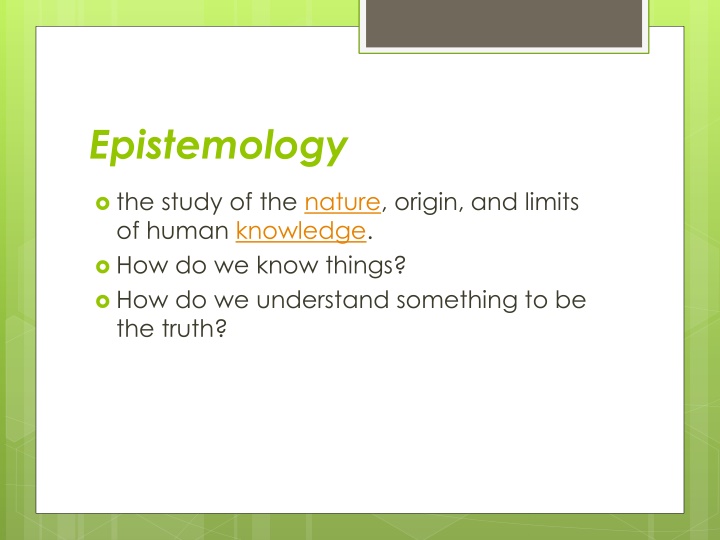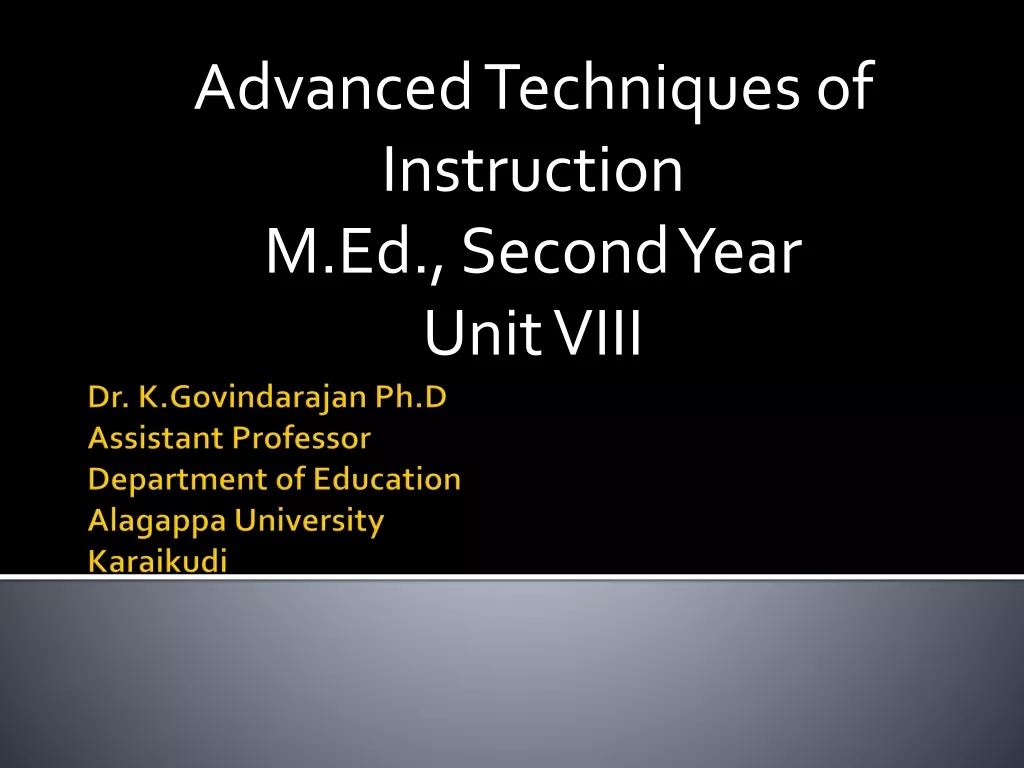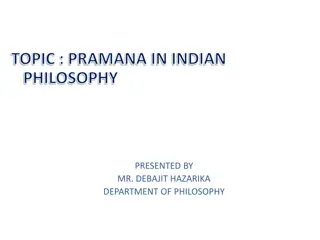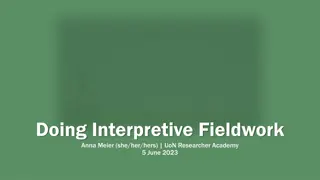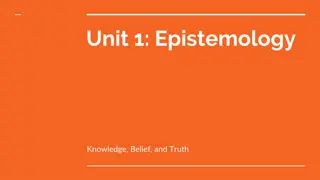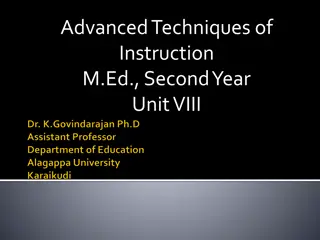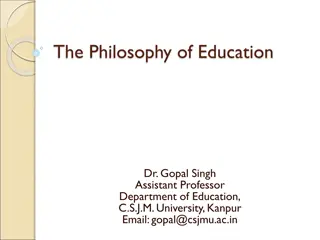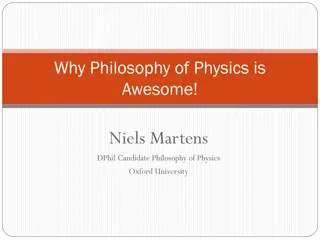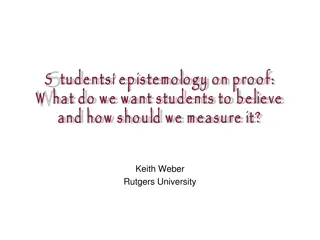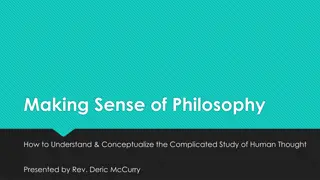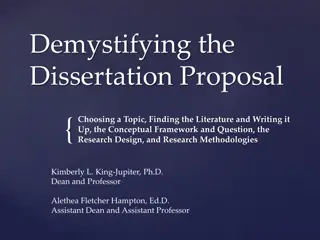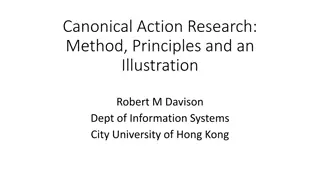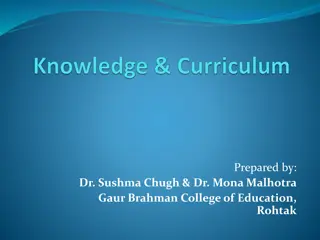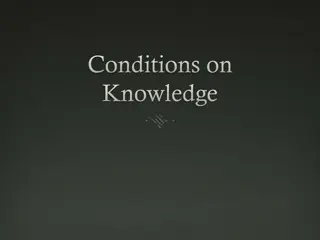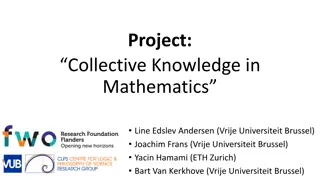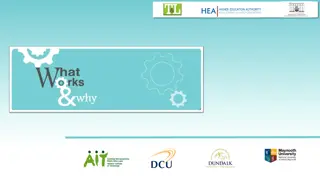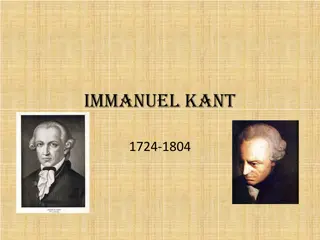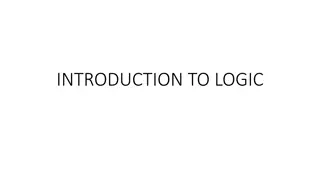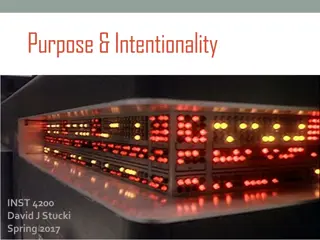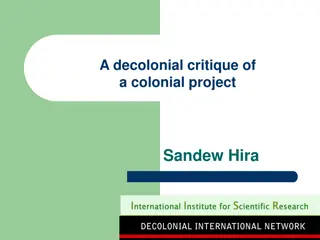Epistemology
Dive into the fascinating realm of epistemology, exploring the nature, origin, and limits of human knowledge. Discover how civilizations interpret truth through communication forms, from oral traditions to written words, and examine the impact of media and entertainment on our perceptions. Unearth the power of metaphors and proverbs in conveying timeless truths and the influence of television on modern discourse. Delve into the intricate interplay between different media types and their ability to shape our understanding of the world.
Download Presentation

Please find below an Image/Link to download the presentation.
The content on the website is provided AS IS for your information and personal use only. It may not be sold, licensed, or shared on other websites without obtaining consent from the author.If you encounter any issues during the download, it is possible that the publisher has removed the file from their server.
You are allowed to download the files provided on this website for personal or commercial use, subject to the condition that they are used lawfully. All files are the property of their respective owners.
The content on the website is provided AS IS for your information and personal use only. It may not be sold, licensed, or shared on other websites without obtaining consent from the author.
E N D
Presentation Transcript
Epistemology the study of the nature, origin, and limits of human knowledge. How do we know things? How do we understand something to be the truth?
Media as Epistemology Epistemology is concerned with the origins and nature of knowledge Definitions of truth and the sources where such definitions come Resonance: metaphor is a generative force that is, the power of a phrase, a book, a character
There is no universal way to know truth, but rather that a civilization will identify truth largely based on its forms of communication.
primitive oral culture great stock in a man who remembers proverbs, since truth is passed on through such stories What is your experience of hearing a story told through spoken word?
Proverb A proverb (from Latin: proverbium) is a simple and concrete saying, popularly known and repeated, that expresses a truth based on common sense or the practical experience of humanity. They are often metaphorical. A proverb that describes a basic rule of conduct may also be known as a maxim.
culture of the written word The rationality of written arguments would be considered superior to a proverb in a culture that values written word Perhaps, rationality and reasoning can override common sense
Television limited our discourse to where all of our serious forms of discussion have turned into entertainment. Television has influenced the way we live off the screen. How has TV and other forms of entertainment influenced the way you live off the screen?
Metaphors that Resonate Athens=intellectual excellence Hamlet=brooding indecisiveness
Media as Metaphor A medium has the power to fly beyond its material context into new and unexpected ones, because of the way it directs us to organize our minds and integrate our experience of the world Different media resonate in different ways Resonance is metaphor writ large
Medium of TV Creates new forms of truth-telling According to Postman, the epistemology of TV is inferior to a print based one Amusement (and pleasure) is how TV communicates Ironically, in the late 90 s David Simon turned away from print journalism and to TV, because the former had gone the way of entertainment (as Postman predicted)
Emotional Power of TV Postman does not deny the emotional power of TV, because it could arouse sentiment against the Vietnam War or against racism. We must be careful in praising or condemning a medium because the future may hold surprises for us (enter The Wire) Superior Serial Melodrama and multi-sited ethnography
Simon Uses emotional resonance to inform people of the negative systemic issues of the American inner-cities Melodrama as a means to communicate and possibly persuade Multi-Sited ethnography
Literate Culture Common Sense by Thomas Paine published 1776 The popularity of that book at the time is close to an event like the Superbowl Different classes were all interested in reading about a variety of subjects Printed matter was all that was available America was founded by intellectuals
Literate Culture Approaches the world from a rational perspective based around a series of rational propositions that challenge a reader or audience to judge them as true or false, the entire society was founded around the idea of rational discourse. (Going back to the telegraph) Peek a Boo world
The Age of Exposition" defined Typographic America Exposition: a comprehensive description and explanation of an idea or theory. replaced by a spectacle that prizes flash and entertainment over substance. The message itself is less important than the entertainment value of its delivery. The Wire is all about exposition The Wire addresses its subject matter in a complex multi-sited way
TV demands rapid-fire editing, non-stop stimulation, and quick decisions rather than rational deliberation Also, the pleasure of an ending that ties everything up into a bow No spoilers either! The pleasure of a surprise ending. The Wire has shorter beats, but its editing is quiet allowing the viewer to experience the naturalism of each location The Wire, uses no flashy effects or even a musical score
Conventions Conventions are the generally accepted ways of doing something. There are general conventions in any medium, such as the use of interviewee quotes in a print article, but conventions are also genre specific.
Story Conventions Closure, Safety, Discourse Structure of CSI Structure of Law and Order What do those shows mean? What are they saying?
Causal Connections People are less likely to keep events straight if a story is not causal and merely sequential Many times when causality is not part of a sequence of events it will be supplied by the viewer/reader
Canonical Story Format Introduction or Exposition: Explanation of setting, basic character attributes, equilibrium Complication Action: Introduction of conflict, obstacles, Ensuing Events dealing with conflict Conclusion, outcome, ending.
Primacy Effect Initial information establishes a frame of reference to which subsequent information is subordinated as far as possible Ex: When a character is presented as virtuous they will tend to be considered so even in the face of some contrary evidence Ex: When we are hearing the state/prosecution s story as the truth we are led to believe that s how things really happened
Delayed Gratification (Retardation) Essential to narrative structure Expository interruptions Blocked expectations balanced with immediate ones Delay in satisfying hypothesis can be exploited to trigger new expectations A viewer s hypothesis can be clearly validated, invalidated, or left dangling Perceptual hypotheses tend to be vague and open ended and they are seldom disconfirmed
SIN MURDER AND NARRATION Transtextual motivation is a strong factor in determining a story s narrational options. The Detective film (Serial) The Melodrama (The Wire) Detective Film: Serial
Crime Cause of Crime Commission of Crime Concealment of Crime Discovery of Crime
Investigation Beginning of investigation Phases of investigation Elucidation of crime Identification of criminal Consequences of identification
The detective film justifies its gaps and retardations (delayed story development) Controls knowledge The genre aims to create curiosity about past story events Suspense about upcoming story events Surprise with respect to unexpected disclosures about the story We learn what the detective learns when he or she learns it
We are not allowed access to the detectives inferences until he or she voices them The activity of piecing together cause and effect in the crime plot constitutes the central formal convention of the detective tale Privileged access to his character and motives Romance becomes another factor. The detective is attracted to the Femme Fatale even if he suspects them of deception, betrayal or even worse (Could be why listeners interpret Sarah as in love with Adnan.)
Ethnography A method of nuanced qualitative social research in which fine grained daily interactions constitute the life blood of the data being produced Simon s work from back to the Baltimore Sun could be described as ethnographic from the beginning
Methodology for The Corner Long-term, one year stay in the field where a particular set of social relations can be observed The observer learns the visuals and the habits of the culture by following selected individuals in their work and daily lives Police culture and drug culture Stand-around-and-watch-journalism
George Marcus Inherent problem with the ethnographic method Concentrates on a specific location of study single site ethnographers have recourse to a larger whole that has not been studied in so deep a systematic fashion Researchers do not have data for the whole This amounts to an abstraction: the state, capitalism and so on. Enables some sort of closure He and others developed an ambition to undertake a multi-sited ethnography One that can approach the system as a whole
The problem No single ethnographer has enough knowledge of enough worlds or enough time to map this constantly evolving world system
ethnographic imaginary World enough and time
Simons unique fabrication of ethnographically informed serial television melodrama speaks to this according to Williams Makes arguments, sets up contexts that could not be managed in journalism alone Serial television melodrama, according to Williams, makes possible the larger canvas of the ethnographic imaginary
Combined factual, ethnographically observed, and detailed worlds of cops and corners into one converged fictional world With the exception of Spike Lee s 1995 adaption of Richard Price s novel Clockers there had never been a film that had given equal time to both sides of the law
Season 1 Breaks crime story conventions Introduces a crime A cop who pursues solving the crime Higher ups who have no interest in solving the crime Doesn t stay with the cop, but moves to the complex world of the committer of the crime Humanizes that character as well Equally important procedures of cops and dealers are introduced
Comparison between two microsites Cops who want to be good and cops who just want to bust heads Competent drug dealers vs. ones who lack the discipline to avoid capture
Complexity of the Series microsites (plotlines) Politics Different police details Education Co-ops War on drugs and Hamsterdam Etc.
The vivid and interlocking stories from so many concrete ethnographic sites is what fiction affords, what ethnography aspires to, and what newspaper journalism can rarely achieve Multi-sited ethnographic imaginary that no longer needs to depend on allusions to abstract ideas of the state, the economy , or capitalism as its fiction of the whole The many sites reveal a vivid picture of that whole
Simon had to quit the business he loved and turn to television Hasn t fully embraced the form Hence the comparison to Greek Tragedy?
John Carroll and Bill Marimow From Baltimore Sun (criticized The Metal Men 1995 Said it was too much like The Corner and that it wasn t hard enough on the thieves Simon believed that newspapers should adopt a wide sociological approach to the city s problems His editors thought he should be more clear and focused on right and wrong
Rifle-Shot Journalism One story is small and self-contained and has good guys and bad guys The other is about why we are where we are About who is being left behind Harder to report Carroll and Marimow saw them as performing a public service that can t reach for the larger ethnographic complexities
Rifle-Shot vs. Multi-Site Rifle shot is like a half hour of episodic television whose world is necessarily narrow and whose time is limited to a half hour or hour In contrast, Simon s reporting presented an expanded world view Transforms a social type to a human being
White Middle Class Editorializing In The Corner, his editorializing has an identity In The Wire he shows instead of telling (Which is more truthful?)
In place of the five-paragraph rifle-shot story he would eventually create a five- season cumulative serial whose primary outrage-a futile war on drugs-encompasses myriad others Serial melodrama can show us, in a way sociologists and ethnographers cannot, how much as Detective Lester Freamon puts it, all the pieces matter.
Crime Story vs. Melodrama Controls knowledge The genre aims to create curiosity about past story events Suspense about upcoming story events Surprise with respect to unexpected disclosures about either story or plot detail We learn what the detective learns when he or she learns it Focus tends to be on finding out who committed a crime Closure leading towards full knowledge Story can rely on broad Story can rely on broad emotional impact emotional impact Evokes pity, sometimes irony or Evokes pity, sometimes irony or distanciation distanciation. . Sirk Sirk and and Bertholdt Bertholdt Brecht Brecht Maximizes Maximizes the viewer s urge to know what the viewer s urge to know what will happen next will happen next and, especially, how any and, especially, how any given character will react to what has given character will react to what has happened happened The The emotional expressiveness of the film emotional expressiveness of the film issues partly from the narration s tendency issues partly from the narration s tendency to be to be omni omni-- --communicative communicative To To wring every emotional drop out of the wring every emotional drop out of the narration employs omniscience narration employs omniscience Various Various characters discover what viewers characters discover what viewers already know already know Unrestricted Unrestricted knowledge storylines storylines knowledge: of multiple : of multiple Crosscutting Crosscutting different different plotlines plotlines Following Following several characters from one several characters from one locale to locale to another another Expanded Expanded range of knowledge range of knowledge Plot Plot will inform us of initiation of a chain of will inform us of initiation of a chain of action and then skip over some time or action and then skip over some time or move to another line of action move to another line of action
